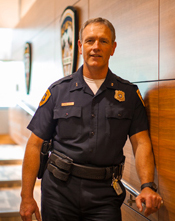Knock, knock… Who’s there? This old children’s joke doesn’t have a funny punch line when the answer is …POLICE!! Community awareness about no-knock warrants has been heightened due to last year’s shootout in Ogden and the subsequent suicide of Matthew Stewart. On October 11, 2012, in Salt Lake, a narcotics team with guns drawn served a no-knock on the home of an elderly lady It was the wrong house — a mistake that has changed the way SLCPD does business.
In the struggle between police safety and constitutional rights, perhaps the best resolution is increased professional training and oversight. To eliminate dangerous mistakes, the SLCPD has centralized the serving of no-knock warrants under the tactical SWAT team commanded by Deputy Chief Terry Fritz. In essence, the buck stops with him.
The SLCPD team has 27 officers. They determine whether a no-knock warrant is justified based on a point system. Does the suspect have prior arrests for guns, assault, armed robbery? If the number is high and the charge is a felony, police then request a no-knock warrant from a district judge.
Fritz reviews how the warrant is to be served. Is the address correct? Are there children present? With the questions answered, officers serving the warrant loudly announce, “POLICE!! We have a warrant!!!” and then forcibly enter the residence.

“There are a lot of different steps to make sure this is done properly,” Fritz says. Last year, his unit successfully served 55 no-knock warrants. In his four years as deputy chief, Fritz says all warrants have been properly served by his division.
Most no-knock warrants are narcotics related. When a threat number is low, a “knock and announce” approach is used. This is done by officers in khaki uniform instead of full SWAT attire. “We knock and say ‘Police, we have a search warrant!’ and wait about 20 seconds for a response. If we hear or see nothing, then officers kick the door down.”
Before officers can apply to the SWAT team, they must have at least 18 months of street experience. They then undergo 40 hours of basic training and constant training afterwards. Fritz has been an officer for 26 years and firmly believes that SWAT officers should not embrace a paramilitary attitude. “We should at all times be courteous dealing with fellow citizens,” he says. “We are subject to judicial review. As Chief Burbank says, we are part of the community, not apart from it.” §





